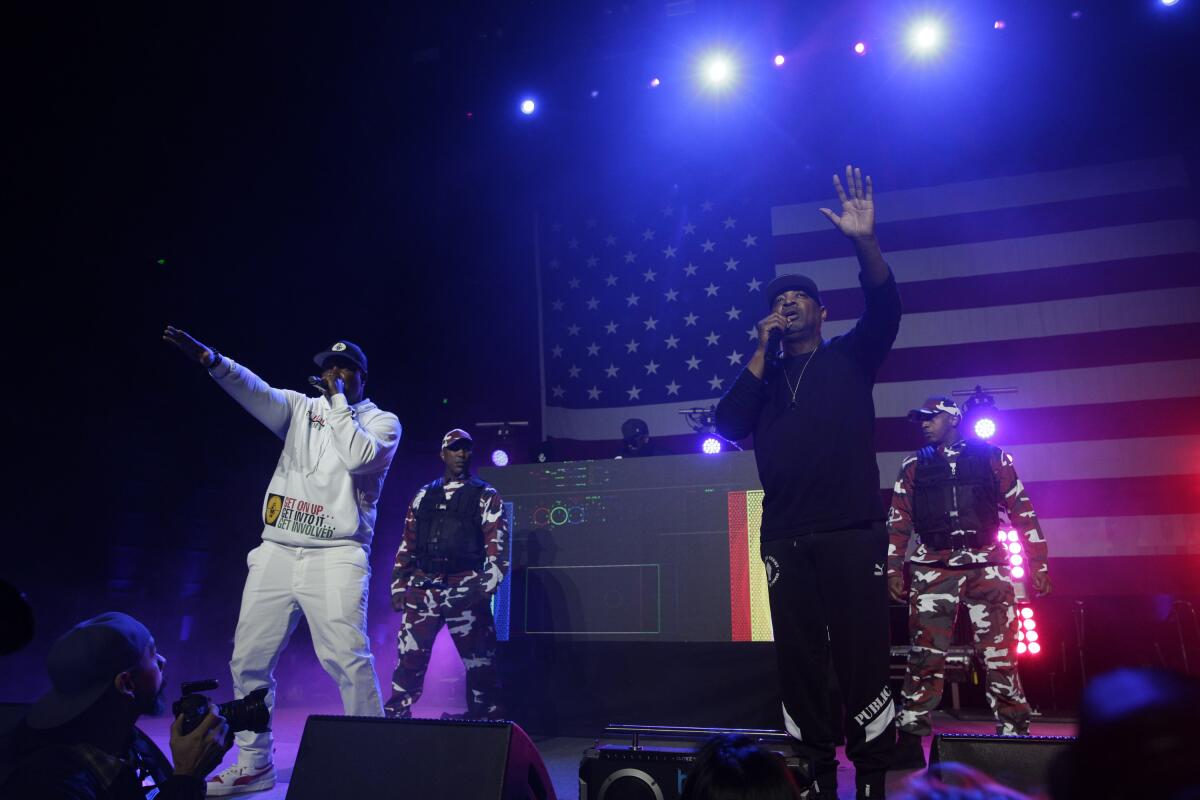Column: Hip-hop has spent 50 years as a witness to racism and brutality. Its work is not yet done.

- Share via
Dear hip-hop,
I can’t believe you’re 50.
Five decades of moving the crowd — starting with DJ Kool Herc’s house parties at 1520 Sedgwick Ave. in the Bronx back in ’73 — and look at you now … not a single wrinkle.
But there are a few scars.
Some of them were self-inflicted, like the perpetuation and monetization of the East Coast-versus-West Coast rivalry. Most others stem from outsiders trying to silence you. Like when the Grammys waited until you were old enough to drive before establishing a category for you in 1989. And that’s just one example of how America tried to silence you. Your coming-of-age movie begins with Tipper Gore buying her 11-year-old daughter a copy of “Purple Rain,” and it ends with 2 Live Crew becoming the first act to have that black-and-white “Parental Advisory” sticker slapped on it.
Opinion Columnist
LZ Granderson
LZ Granderson writes about culture, politics, sports and navigating life in America.
During a congressional hearing during that whole saga, folk singer John Denver testified: “The suppression of the people of a society begins in my mind with the censorship of the written or spoken word. It was so in Nazi Germany; it is so in many places today where those in power are afraid of the consequences of an informed and educated people.”
Thirty years later, the 1619 Project is being banned in schools, and “critical race theory” has become public enemy No. 2.
The title of public enemy No. 1 is already spoken for.
When Chuck D of Public Enemy pointed out in 1990’s “Fight the Power” that John Wayne was a racist, the rapper was the one who took the criticism from America even though Wayne said in a Playboy interview in 1971, “I believe in white supremacy.”
In the 1950s, LAPD Chief William Parker actively recruited white males from the South to patrol predominantly Black neighborhoods in Los Angeles. He called Black people “monkeys” in the newspaper, but it was the lyrics of those who grew up in these conditions that drew America’s scorn.
You had the world’s attention at that point, and the spotlight was harsh.
N.W.A was 30 seconds into an anti-police anthem on a stage in Detroit back in 1989 when chaos broke out, ending the show abruptly. It turned out to be not gunfire, but cherry bombs set off by police.
“I’m the person that was literally two feet away from the police when they lit the fireworks, or the firecrackers,” DJ Speed of N.W.A told GQ in 2020.
At that time, America was beginning to understand that the George Floyd video showed what N.W.A had been trying to communicate. Today we have the Tyre Nichols video. Decades before, we had the Rodney King video. Through it all, two things have remained true: America never needed a video to confirm systemic racism existed in the first place. And you, hip-hop, were never afraid to point that out.
We just needed to listen.
Which is why so much effort was put into trying to shut you up.
But like the other forms of music born out of the African diaspora — including gospel, jazz, reggae and rock ’n’ roll — you only grew stronger from the attempts to silence you.
In 1989 the Grammys didn’t televise the rap award presentation. In 1990 a rap album spent the most weeks at No. 1 on the Billboard charts. That’s because the sound came from a people whose voices could never be silenced. This is why Black music is described as having an “uncapturable spirit” in the “1619 Project” docuseries. Hip-hop may be 50, but its lineage stretches back much further.
I can even see bits of your life story playing out this year as Glendale, Ariz., prepares to host the Super Bowl.
Terminal 4 at the Phoenix airport is named after Barry Goldwater, the Republican candidate for president in 1964. Goldwater voted against the Civil Rights Act that year, and Martin Luther King Jr. tactfully said that the Arizona senator “articulates a philosophy which gives aid and comfort to the racists.”
Goldwater lost, but King’s critique remains relevant because of the rhetoric of those like Goldwater. Of course, Arizona lost the chance to host the Super Bowl in 1993 because voters there refused to recognize the King holiday, an act of racism that inspired a Public Enemy song.
Once again, hip-hop drew criticism. But through it all, you refused to be silenced. Now here you are — 50 — and looking just as fine as ever. Your golden years begin with the first Super Bowl to feature two Black starting quarterbacks, a position that had been kept away from Black men under the guise they were not intelligent enough for the position. This Super Bowl will be held in a state that once refused to acknowledge King’s greatness. And even now, in 2023, attendees will be flying into an airport with a terminal named after a man who voted against equality.
“By the time I get to Arizona,” indeed.
In the first 50 years, America tried to silence you. Instead, you changed America. Can’t wait to see what happens in the next 50.
More to Read
A cure for the common opinion
Get thought-provoking perspectives with our weekly newsletter.
You may occasionally receive promotional content from the Los Angeles Times.












